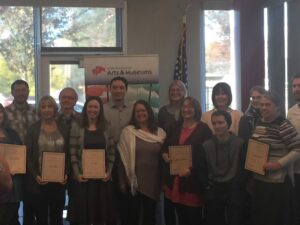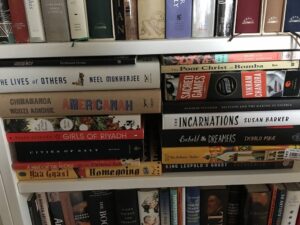My short story “Out To Pasture” was published by the Saturday Evening Post. You can read it here: https://www.saturdayeveningpost.com/2023/08/out-to-pasture/
Getting Ready to write
I love to fast draft during National Novel Writing Month. Last week I wrote about the advantages of spending a bit of time prepping for NaNoWriMo on their blog. Here is the link: https://blog.nanowrimo.org/post/664513833181806592/preparing-before-nanowrimo
Write Poetry Project
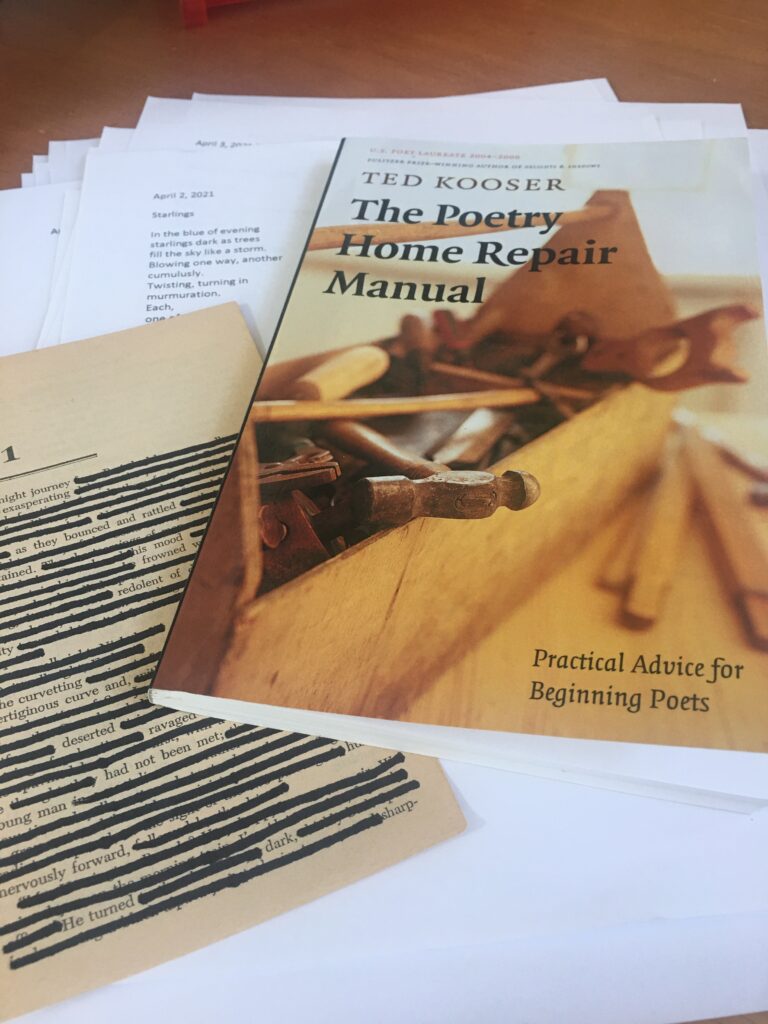
30 Poems in 30 Days
One of my mini writing goals for 2021 is to write poetry several days a week. I have always been intimidated by poetry—and reading it used to make me feel like the person who doesn’t get the joke.
How to conquer one’s fears: dive in, do it, understand it.
I asked my poet friend Lisa Roullard (An Envelope Waiting) for good how-to books for beginning—and intimidated—wannabe poets. She recommended Mary Oliver’s A Poetry Handbook and Ted Kooser’s The Poetry Home Repair Manual. I also bought books of each one’s poetry. I read at least one poem before bed—it’s a habit I plan to keep from now on.
Mary Oliver tackles the nuts and bolts—dactyls versus trochee. The terms still sound like dinosaur names to me. I relate more to Kooser’s practical advice—dive into close detail, write about something that means something. I kind of prefer Oliver’s poems though.
I’ve scrawled bad poems into my writing exercise notebook every week. And then I got an intriguing email from the Salt Lake Community Writing Center—Celebrate National Poetry Month by writing 30 poems in 30 days according to Instagram prompts. I paid my $5 to join the contest, knowing that any sort of accountability is good for writing one isn’t exactly driven to do.
I hated some of the prompts. Turns out that only made things interesting as I stretched my creativity further to find an entry point into the prompt. I had to meditate and write. I clipped words from magazines and wrote. I wrote all 30 poems. I revised all 30 poems.
Four and a half months into my Write Poetry Project, I have learned that poetry needs to be revised like any other writing. Some things that I had wanted to write about for a long time seem to be particularly suited for poetry. Practice works! I have written some poems that aren’t too bad. I’m also determined to make the bad ones better! Reading is always a companion to writing—you absolutely must read what you want to write.
Mostly, I am learning to appreciate poetry in a new way. I might be starting to like it…
Women Writing The West Conference Takeaways
I joined another writing organization this year: Women Writing The West. Every year they have a short story contest called the Laura as well as a published fiction contest named The Willa (with categories from children’s, YA, poetry, nonfiction, contemporary and historical fiction). The focus is on stories told in the west with female protagonists – like the ones Laura Ingalls Wilder and Willa Cather told. The group also creates a beautiful catalogue of member’s books that is distributed to more than a thousand bookstores each year.
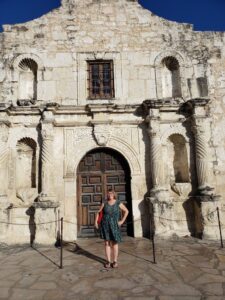
The organization also hosts an annual conference in a different western city each year – the 2019 event was held in San Antonio, Texas. I love a good field trip – and this conference had three! We visited The Alamo, the Briscoe Western Art Museum and the World Heritage Missions outside the city. What a treat to see such sites with a group of well-informed and curious women!
I tend to write contemporary stories – with the exception of the story-within-a-story in Jungle Crossing about an ancient Mayan girl. No matter what I write I like to do a fair amount of research, probably because I have a nerdy love of learning about almost anything! I decided to attend a lot of sessions about research at the conference.

Jane Kirkpatrick and Pam Nowak talked about finding something strange in your research and fully exploring it – being careful to look for the shared knowings when coming across disparate accounts of a historical event. Also – work to think beyond your own interests to find something that will interest a variety of readers.
Elizabeth Boyle talked about the importance of hands-on research. As someone who loves to go places to learn about my characters and settings, I loved this advice. I also liked her idea about making a list of things that you need to learn in order to write the story.
General interest books are great if you know very little about a topic, but the more you know, the more you need to narrow your focus and find specific expertise. She highlighted the importance of books over online sources because footnotes can lead to all kinds of story potential. My next WIP came from a vague reference that I couldn’t stop thinking about. So I agree: books rule in research!
When you’re out and about researching, find the right person. Don’t let one person tell you no. Go to the next one. Join local organizations that may give you special access for a small membership fee. Visit during the less busy seasons, so the staff has time to spend answering your questions.
Another session with Jane Kirkpatrick, Kim Nowak, and Gail Jenner talked about how we need to find the common struggles that we share with women from the past – as modern women. I think this advice works for all characters – finding some connection with which we can identify will make it more likely that our readers will feel the same way.
The panel also emphasized that you have to start writing before you think you should. Otherwise you’ll never start. I love this advice, as someone who went and took a major’s worth of history classes before starting to write a novel that I never got around to writing. Yikes, right?
Think of it like a horse race, they said, just get the story down on paper!
Barbara Brannon talked about several ways to find information from various records to newspapers. She talked about how it can be helpful to transcribe things like letters before trying to understand the significance of the content. I admired the way she used her research to inform all types of writing from fiction to poetry to song. She got our her guitar and sang for us!

All the women I met were so welcoming and incredibly inspiring. So many women in this organization have had long writing careers and show no signs of slowing down. Very inspiring!
Next year’s conference is going to be in Colorado Springs, Colorado from October 15-18, 2020 – and the field trips look fantastic!
Contest Win!
I’m excited to announce that my newest manuscript Thoughts and Prayers won second place in the Utah Arts Council Original Writing Competition in the Novel category. It’s my first story for adults, although I snuck a couple of teenage characters into the mix!
I also did an interview with the Davis Clipper. You can read that here: http://davisclipper.com/news/writer-places-in-state-competition/
2017 Reading Project: Expanding My Worldview
For the past few years, I’ve focused about half the books I read into what I call Reading Projects. Sometimes I read to prepare for a trip – so that I understand the history and culture of the place I’m visiting. I have a lifelong project to read a biography about each American president. Right now I’m finishing up a series of books about the 1920s. Just for fun – and to catch a few classics I had missed along the way. I’m old enough to appreciate them more now 🙂
A few months ago my 17-year-old daughter came home from school, insisting that I watch the TED talk her English teacher had shown in class: The Danger of A Single Story by Chimamanda Ngozi Adichie. Not only did the talk inspire me as a writer, it inspired me as a reader.
My 2017 reading project will be to read at least 12 books from non-European cultures. I also plan to include some history for context. I write a brief note about all the books I read on Goodreads (https://www.goodreads.com/SydneySalter), but I plan to blog about my 2017 Reading Project.
I am so excited to learn more about people all around the world!
Must Reads For YA Writers
A few years ago whenever people asked me how someone my well-past-teen age could write YA, I’d explain how the emotions have remained consistent since I was a teenager.
I’m not sure that’s entirely true anymore. Oh, sure we all still experience a range of emotions, but the prevalence of social media has shifted the landscape in a profound way. Even while parenting teens, I’ve noticed dramatic changes in the four years separating my daughters. As a parent, I know I’m always a step behind. So what does that mean for my drawer novels? More concerning: what does it mean for my WIP?
Thankfully, two great new books will help both writers and parents bridge the gap.
I purposely sat next to different moms during every soccer game, flashing American Girls: Social Media and the Secret Lives of Teenagers by Nancy Jo Sales. The book inevitably provoked an interesting conversation with my fellow soccer moms. I wish every mom, teen and writer would read this one. It’s a bit harrowing at times. One night my 16-year-old daughter snuggled next to me in bed and read a few chapters along with me. She plans to finish it on her own this summer. We’ve already had so many great discussions about social media, the pressure on girls, and how we use technology.
The bright pink title of Girls & Sex by Peggy Orenstein
made me wonder what rumors might ensue if I read this one at halftime. Ironically, the social media book is more graphic. I loved Orenstein’s thoughtful interviews on wide-ranging topics. She truly respects her teenage subjects while remaining an adult. YA writers could benefit from her writing voice, in addition to the subject matter. This one is now waiting on my college-aged daughter’s bed for when she arrives home next week. Her sister will read it next.
As a parent, I often wish the world were different for my daughters–and I know many parents who pretend things haven’t changed all that much.
The problem comes when we don’t acknowledge the way things have changed, as writers. Readers depend upon us not to talk down to them. To portray the truth. Provide a realistic slice of life.
That means keeping up with changing times. We owe it to our readers!
Book Versus Movie: ROOM
Over and over again this happens: I see an intriguing book-based film trailer and hurry to read the book before seeing the movie, but then I like book so much that I never bother seeing the movie. Rarely do movies capture the nuances and subplots that make books so rich and satisfying. I’m especially disappointed with nonfiction adaptations–so much of the good information in the book never makes it to the screen (and probably shouldn’t for storytelling purposes). Oh, The Lady In Gold, the book. Sigh.
 So I never bothered to see Room. The book was SO clever–faithfully maintaining the POV of a five-year-old boy! Clever. Clever. Clever.
So I never bothered to see Room. The book was SO clever–faithfully maintaining the POV of a five-year-old boy! Clever. Clever. Clever.
But then I found myself having seen 6 of the 8 nominees for this year’s Best Picture Oscar. Our great indie theater happened to be showing both Brooklyn and Room, so a double-feature proved irresistible, despite my reservations about Room. The young actor supposedly did a great job…so…but the book was SO clever!
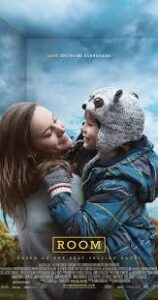 Even though I knew the entire plot, I found myself on the edge of my seat, caught up in intensity and emotion. I hadn’t felt that way while reading the book. Only the mother’s POV could deliver that kind of emotion–a mother’s drive to protect, the heartbreak of losing her own childhood… The boy’s voice came through in the movie too. Yet the movie, released from the constraints of a child’s POV, also captured the dynamic relationship between the mother and son. I left the theater emotionally exhausted, and I couldn’t stop thinking about that young mother.
Even though I knew the entire plot, I found myself on the edge of my seat, caught up in intensity and emotion. I hadn’t felt that way while reading the book. Only the mother’s POV could deliver that kind of emotion–a mother’s drive to protect, the heartbreak of losing her own childhood… The boy’s voice came through in the movie too. Yet the movie, released from the constraints of a child’s POV, also captured the dynamic relationship between the mother and son. I left the theater emotionally exhausted, and I couldn’t stop thinking about that young mother.
I also couldn’t stop thinking about how the book lost too much by being clever. That’s a real danger for us writers, isn’t it? We focus on coming up with the next BIG IDEA without wondering if the truth in the story will suffer. Maybe the most clever way to tell a story isn’t always the best way?
Room the movie wins this battle. I hope it brings home some Oscar statues this Sunday!
Rah-Rah Write!
A couple of nights ago, I had dinner with several writer friends, and we got to talking about Big Magic, Elizabeth Gilbert’s book about living a creative life. Different aspects of the book resonated with each of us.
I love the way she dismisses the notion that we should have to “suffer” for art.
My project this past year has been to put the fun back into my writing life. I joined a pen pal group with people all over the world. I’m working my way through a challenging writing exercise book. I’ve written a dozen short stories. Retreating a bit has reminded me why I write: I LOVE IT! (And I probably couldn’t stop if I wanted to.)
Big Magic is an easy-to-read, light-hearted, and accessible cheerleading book–sometimes we need to remember that the creative life should be a happy one!
Awesome Mother’s Day Gifts For Writers
Mother’s Day is coming May 10th. If you have a mom who loves to write, here are some great gift ideas!
Powell’s Indiespensable Book Club
Good writers are great readers. Powell’s City of Books (worthy of a pilgrimage to Portland, OR) will send your mom a specially-chosen, signed first-edition novel–along with some fun goodies that often relate to the story. Often they send another book too! Writers will also love the author interview included in the package. Packages arrive every six weeks or so.
LizzyKate Tea Of The Month Club
Nothing will help Mom achieve her word-count goals than a lovely cup of tea! LizzyKate will send a selection of three amazingly delicious, high-quality teas in cute packaging every month. You can choose from Specialty teas, Caffeine-Free teas, or both. LizzyKate also has a nice selection of tea-related products to keep mom happily sipping, and cruising along on that WIP!
Chocolate!
If Mom loves traditional truffles, try Legacy Chocolates. Looking for something a little more exotic? Christopher Elbow Artisan Chocolates will satisfy Mom’s cravings. For gorgeous, girly, and delicious chocolate try Gayle’s Chocolates. And if Mom is a history buff check out Kakawa Chocolate House’s elixirs. Nothing brings you back in time like sipping Thomas Jefferson’s cocoa recipe!
If you have young children, or teenagers who seem to spend all their money on lattes and concerts, remember it’s more than okay to give yourself a Mother’s Day gift! Happy writing to all you moms!
